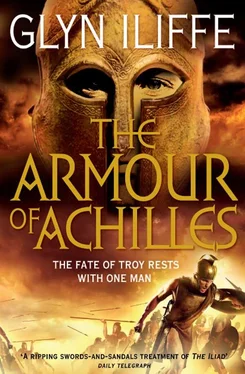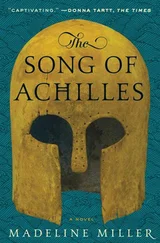Glyn Iliffe - The Armour of Achilles
Здесь есть возможность читать онлайн «Glyn Iliffe - The Armour of Achilles» весь текст электронной книги совершенно бесплатно (целиком полную версию без сокращений). В некоторых случаях можно слушать аудио, скачать через торрент в формате fb2 и присутствует краткое содержание. Год выпуска: 0101, ISBN: 0101, Издательство: Pan Books, Жанр: Старинная литература, на английском языке. Описание произведения, (предисловие) а так же отзывы посетителей доступны на портале библиотеки ЛибКат.
- Название:The Armour of Achilles
- Автор:
- Издательство:Pan Books
- Жанр:
- Год:0101
- ISBN:9781447205098
- Рейтинг книги:4 / 5. Голосов: 1
-
Избранное:Добавить в избранное
- Отзывы:
-
Ваша оценка:
- 80
- 1
- 2
- 3
- 4
- 5
The Armour of Achilles: краткое содержание, описание и аннотация
Предлагаем к чтению аннотацию, описание, краткое содержание или предисловие (зависит от того, что написал сам автор книги «The Armour of Achilles»). Если вы не нашли необходимую информацию о книге — напишите в комментариях, мы постараемся отыскать её.
The Armour of Achilles — читать онлайн бесплатно полную книгу (весь текст) целиком
Ниже представлен текст книги, разбитый по страницам. Система сохранения места последней прочитанной страницы, позволяет с удобством читать онлайн бесплатно книгу «The Armour of Achilles», без необходимости каждый раз заново искать на чём Вы остановились. Поставьте закладку, и сможете в любой момент перейти на страницу, на которой закончили чтение.
Интервал:
Закладка:
Eperitus was enjoying the period of training. The mercenaries were developing quickly, and even the ordinary Ithacans – who for the most part had been farmers and fishermen before the call to war – were starting to show promise. But most of all he looked forward to the evenings, when he would sit with his comrades around the campfire, discussing the progress of individual recruits while eating the food that Astynome’s skilful hands had prepared. Sometimes, when he was not too exhausted by the day’s training, Omeros would join them and sing songs about gods, monsters and long-dead heroes, strumming gently on his battered lyre until he could keep his eyes open no longer. And at the end of the night Eperitus would lie awake in his bed, listening to the sound of Astynome’s gentle breathing from the other side of the hut, wondering what would become of the girl he refused to think of as his slave. Whenever he raised the subject of sending her home to her family – reminding her that he had only ever agreed to take her under his protection – she seemed strangely reluctant to discuss the matter. Equally strange was the pleasure he took from her reluctance. For a man who had always been content to look after his own needs, having another person in his life brought benefits he had never guessed at. Astynome could cook, of course, but she could also wash, darn, clean, oil, polish and a host of other things he had never before given much mind to. Suddenly, the many holes in his tunics and cloaks had all been repaired and his armaments gleamed with an almost embarrassing lustre. She was also strong enough to chop wood or carry clay pithoi filled with water, and yet gentle enough to knead the tension from his back and shoulders after a long day’s weapon training. But despite all these talents, he valued her most for her company. She did not have the cowed dullness of many slaves. Instead, she was opinionated, lively, fiercely patriotic, often rude, and yet never malicious. She would interrupt the men’s conversations with astute comments as she served their wine, or hold long discussions with Omeros about the history and legends of Troy, sometimes teaching him snatches of songs in her own language, made more beautiful by the softness of her voice. She was a gift of the gods, and yet Eperitus knew such gifts were the envy of others and rarely belonged to one man for long.
Odysseus would sometimes join the others around the campfire, though he rarely stayed for long. Since the return of the ships from Ithaca, he had been unusually sombre and withdrawn. But the question of Palamedes remained, and almost two weeks after the king had made his suspicions known, Eperitus took him aside one evening and asked him how he intended to prove the Nauplian was a traitor. Odysseus replied the answer lay with the gods, and that he had the beginnings of a plan.
The next evening, after the day’s training was over and Eperitus was about to start on the meal Astynome had prepared, Odysseus appeared with a wineskin hanging from his shoulder.
‘Come with me,’ he said in a low voice.
He set off without waiting and Eperitus was forced to ignore the wooden dish in Astynome’s hand and set off after the king. Odysseus was weaving a meandering path between the sprawl of tents and huts as Eperitus caught up with him. The camp was a small city, temporary in its nature and yet almost permanent in the length of time it had existed within the crescent of hills that overlooked the bay. Tens of thousands of soldiers from every Greek nation lived there with the wives, concubines, children and slaves that they had accumulated during the long years of the siege. Though their commanders had huts of wood or even stone, the tents of the soldiers were no less homely – like intricate beehives where whole communities worked, ate and slept in close company with each other. And just like the cities they had left behind, the camp was filled with smithies, armourers’ shops, bakeries, covered stalls from which merchants traded their wares, stables, livestock pens, communal latrines and even the altars and crude temples that were vital to any metropolis. Odysseus did not pause in his course, and in the failing light of day managed to dodge skilfully between guy ropes and washing lines and through the constant traffic of soldiers and the numerous dogs, sheep and goats that wandered freely through the camp. At first Eperitus thought he was planning to visit one of the other kings, but as they passed the well-built huts of Menelaus, Nestor, Tlepolemos, Idomeneus, Menestheus and several others, eventually climbing the surrounding hills to the earthwork and ditch that defended the camp, he began to understand who it was Odysseus was seeking, and why. At the top of the ridge, from which they could see the myriad fires of the Greek camp behind them, and the darkening plains towards Troy ahead, they could hear him among the trees on the other side of the ditch. After Odysseus had spoken briefly with the guards, they crossed one of the causeways and followed the mournful sound of drunken singing.
They found him crouched against the crooked bole of a wind-blasted plane tree. His black robe was pulled tightly about his thin body and his hood was pulled over his face. As they approached, he threw back his hood to reveal pale, skull-like features and a head that was bald but for a week’s growth of stubbly black hair.
‘Odysseus?’ he hissed, leaning forward inquisitively. ‘And Eperitus with him. What urgent need brings them to my little kingdom, I wonder? Has Agamemnon sent for me? But no, he only ever sends his slaves. Then they must have come for reasons of their own. I wonder what they might want.’
‘I was hoping you might already have known, Calchas,’ Odysseus answered him, sitting on a rock and laying the wineskin between his feet.
The seer’s dark eyes fixed greedily on the leather bag. He staggered to his feet and took a couple of faltering steps towards the king, his black cloak falling open to reveal the grubby white priest’s robes beneath. As he came closer both warriors could detect the mingled scent of wine, stale sweat and urine. Eperitus’s nose twitched in disgust, but it was nothing compared to the revulsion he always felt in the presence of the renegade Trojan priest, who at the command of Apollo had forsaken his homeland to join the Greeks. It was Calchas who, ten years before, had prophesied that Eperitus’s daughter, Iphigenia, must be sacrificed before the Greek fleet could sail to Troy, and who had led her to the altar to be murdered by Agamemnon.
‘Might already have known what, my lord?’ the priest asked, fixing his bloodshot eyes on a spot just above Odysseus’s head. His left arm was hanging limply at his side, while his right dangled before his chest, the fingers constantly clutching at something that was not there. ‘Might have known some dark secret of the future? Some omen of Troy’s doom, or maybe even . . . your own ?’
He laughed and then belched, before dropping heavily on to his backside and crossing his legs with clumsy awkwardness.
‘Sit down!’ he snapped, frowning at Eperitus. The Ithacan captain remained standing and a moment later the priest’s sudden anger drained away to leave him sullen and depressed. ‘Oh, do what you like – nobody else respects me any more so why should you? A seer whose gift of prophecy has abandoned him and left him with a taste for wine. I should have stayed in Troy, serving my god. You’d have listened to me then, a priest of Apollo! Damn your stubborn, warrior’s pride.’
‘But the gift hasn’t left you, Calchas,’ Odysseus said, his voice slow and calming. ‘Or so I hear. Agamemnon still sends for you, even if the rest of the Greeks shun you. It’s said the King of Men asks you to interpret his dreams and that he confides all his plans in you, and that sometimes – sometimes – Apollo lets you see things. Have I heard wrong?’
Читать дальшеИнтервал:
Закладка:
Похожие книги на «The Armour of Achilles»
Представляем Вашему вниманию похожие книги на «The Armour of Achilles» списком для выбора. Мы отобрали схожую по названию и смыслу литературу в надежде предоставить читателям больше вариантов отыскать новые, интересные, ещё непрочитанные произведения.
Обсуждение, отзывы о книге «The Armour of Achilles» и просто собственные мнения читателей. Оставьте ваши комментарии, напишите, что Вы думаете о произведении, его смысле или главных героях. Укажите что конкретно понравилось, а что нет, и почему Вы так считаете.












